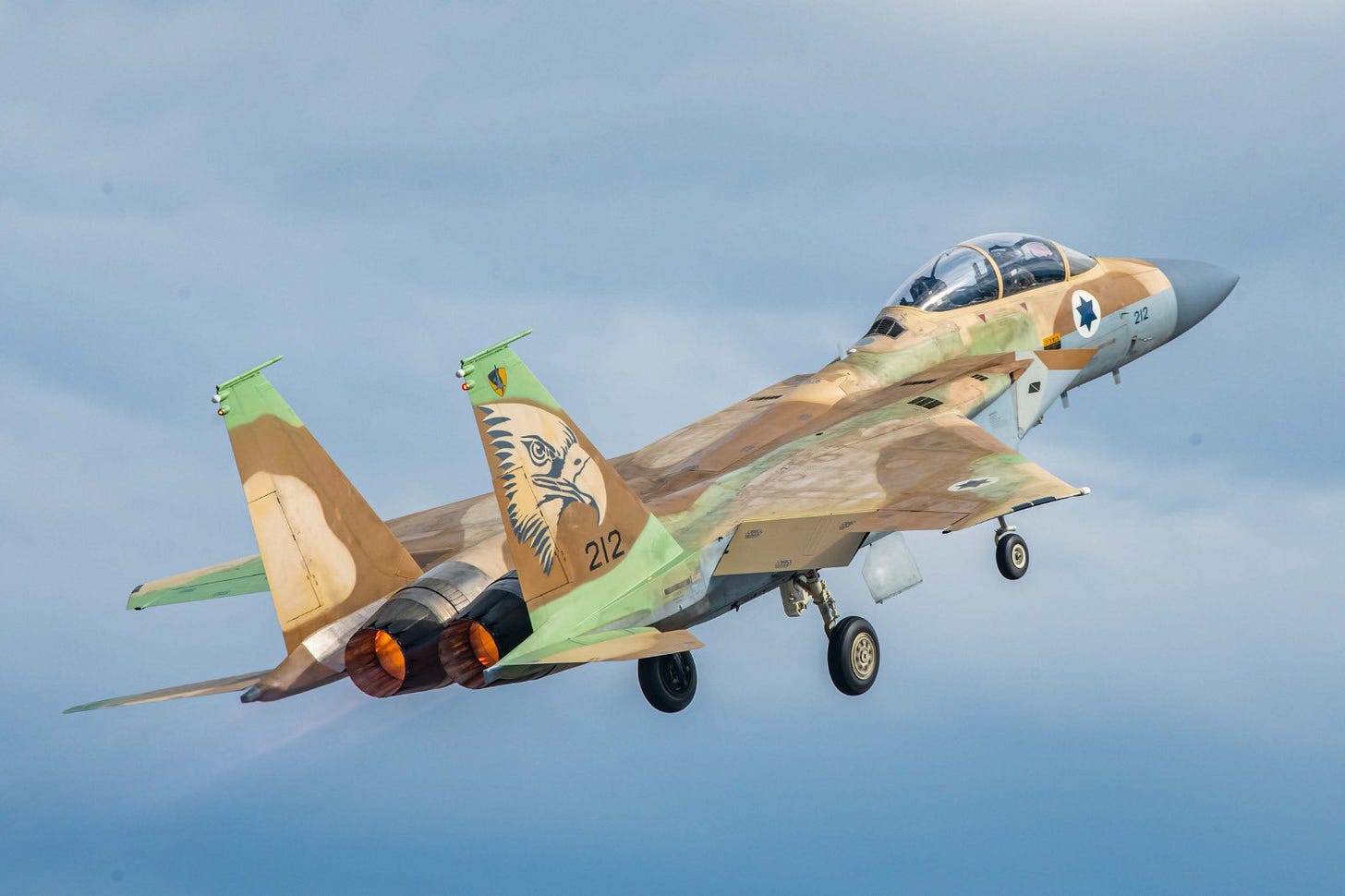Peace in the Middle East requires strength, not negotiations.
Ideals mean nothing if you don’t exercise the power to protect them.
Please consider supporting our mission to help everyone better understand and become smarter about the Jewish world. A gift of any amount helps keep our platform free of advertising and accessible to all.
You can also listen to the podcast version of this essay on Apple Podcasts, YouTube Music, YouTube, and Spotify.
During the first conversation between Israeli Prime Minister Benjamin Netanyahu and then-U.S. President Joe Biden following the Hamas-led massacre in Israel on October 7, 2023, Biden implored Israel to show “restraint” in Gaza.
Netanyahu’s response was simple: “Strength is what matters most in the Middle East.”
It is no mistake that a Left-wing leader of the free world would preach “restraint” just hours after the worst attack on Jews since the Holocaust. Israel’s response to Hamas, Hezbollah in Lebanon, and now Iran has been robust and unwavering. Because, in the Middle East, strength is not just respected; it is the only language understood.
This is something liberal leadership in much of the Western world, from Europe to Australia to Canada and the United States, continues to misunderstand. They believe “diplomacy” will suddenly change regimes and ideologies which openly reject them. They believe peace with purely evil characters comes from dialogue and compromise.
For years, Western diplomats issued statements, signed toothless deals, and held photo ops while Iran sprinted closer to nuclear capability. But nuclear centrifuges don’t respond to hashtags or United Nations votes; they respond to sabotage, bunker busters, and precision strikes. Peace is not earned through statements of concern; it is secured through actions that change reality on the ground.
That’s why what happened over the past 10 days has fundamentally changed the trajectory of the region.
After years of appeasement, hesitation, and diplomatic theater, the United States finally acted. In a historic show of resolve, U.S. military forces, working in close coordination with Israel, launched precision strikes on Iran’s nuclear facilities. The results were nothing short of overwhelming. Tehran’s nuclear ambitions — nurtured in secret bunkers, backed by the Islamic Revolutionary Guard Corps, and protected by layers of disinformation — were obliterated.
This wasn’t just a tactical victory; it was a strategic earthquake.
For years, Iran played a double game — radical abroad, victim at home — while advancing toward nuclear breakout. Western officials wrung their hands and wrote sternly worded memos. Meanwhile, Iran bankrolled terror in Iraq, Yemen, Lebanon, Syria, Gaza, and the West Bank. They armed proxies. They destabilized governments. They printed slogans like “Death to America!” and “Wipe Israel off the map!” on ballistic missiles.
Israel sounded the alarm. The West hit the snooze button.
Until now.
The destruction of Iran’s nuclear infrastructure, both above ground and deep beneath it, delivered an unmistakable message: The red line has not only been drawn, it has been enforced.
The Iranian nuclear regime misjudged the resolve of the West. Years of appeasement under Barack Obama and hesitation under Joe Biden convinced them that America had lost its backbone. In the Persian language, the name Obama can be transliterated to mean “He is with us.” — a joke that became common among Iranians who believed, with some justification, that the American president was more aligned with Tehran than with the West.
Regardless, the Iranian nuclear regime forgot the iron rule of the Middle East: If you push too far, the West and Israel will push back. And hard.
I’m reminded of a video I once saw shortly after October 7th of a former Islamist in Europe. He explained that when he was a radical, he always voted for Left-wing parties. Why? Because liberals, in his words, were easier to manipulate. They lacked the will to defend their values. They sought peace at all costs, even if that meant tolerating the intolerant.
It was, paradoxically, the Right — those most committed to national identity, security, and strength — who were hardest to break. They set boundaries, and they enforce them. They understand that pluralism cannot survive if it refuses to defend itself.
This isn’t a knock on liberal values in theory like freedom, tolerance, inclusion; it’s a recognition of their failure in practice when divorced from strength. Because ideals mean nothing if you don’t have the power to protect them.
Those who truly understand the Middle East know that peace, calm, and stability here has never come from compromise. It has come from victory. When did Israel sign peace deals with Egypt and Jordan? After it proved, in no uncertain terms, that it could not be destroyed. When did Arab states begin opening diplomatic ties with Israel? After it became clear that the Jewish state was here to stay — resilient, innovative, and powerful.
And when did the U.S.-Israel relationship become what it is today? Not in the fragile early days of 1948, but after 1967 — following Israel’s miraculous victory in the Six-Day War, defeating multiple Arab armies in less than a week. The image of Israeli paratroopers at the Western Wall didn’t just inspire Jews; it awed the world, including America.

Let’s also recall that, when Saddam Hussein invaded Kuwait in 1990, the international community responded not with dialogue, but with force. A U.S.-led coalition launched Operation Desert Storm, swiftly liberating Kuwait and crippling Iraq’s military capabilities. Though Saddam remained in power, his regional ambitions were neutered. For the next decade, he posed a limited threat, not because of diplomacy, but because he had been decisively beaten.
Even outside the Middle East, the fact that strength cultivates peace has been true throughout modern history. Peace in Europe and the Pacific did not come from compromise or careful diplomacy; it came from the total defeat of evil. Nazi Germany and Imperial Japan were not persuaded to change course through sanctions or speeches; they were destroyed by the overwhelming military force of the Allies. Only after their unconditional surrender did peace become possible. The lesson is enduring: You don’t negotiate with genocidal regimes, you defeat them.
The transformation of Japan from imperial aggressor to peaceful democracy is one of history’s clearest cases of peace born from dominance. After suffering defeat in World War II, including the devastation of Hiroshima and Nagasaki, Japan surrendered unconditionally. Under American occupation, it demilitarized, democratized, and reoriented toward peaceful growth. That peace wasn’t negotiated; it was imposed. And it endured precisely because it was backed by strength.
For nearly half a century, the world avoided nuclear Armageddon not because of mutual trust, but because of mutual fear. The doctrine of Mutually Assured Destruction (the understanding that any nuclear attack would be met with total annihilation) kept both the United States and the Soviet Union in check. The balance of terror, as brutal as it sounds, was a form of peace enforced by the threat of unimaginable strength.
When President Ronald Reagan called the USSR the “evil empire” and ramped up American defense spending, many in the West panicked. But Reagan understood something others didn’t: Strength breaks stalemates. The Soviets, burdened by an unsustainable arms race and internal rot, eventually collapsed under the pressure. The Cold War ended not with a handshake, but with a superpower losing the will to compete — because it was outmatched.
Those who mourn the use of force in the name of peace have the story backwards. They forget that force is often the only thing that restrains evil. Iran’s nuclear regime was not a hypothetical threat; it was a genocidal one.
And yet, despite the clarity of this moment, the usual suspects are already scrambling to revive tired talking points. Some have begun to compare this campaign against Iran to the 2003 invasion of Iraq — perhaps the laziest, most superficial analogy in modern foreign policy discourse.
Iran 2025 is not Iraq 2003. Iraq was a fractured dictatorship bluffing about weapons of mass destruction. Iran is a revolutionary theocracy actively enriching uranium, openly threatening genocide, and commanding a vast terror network across the region. One was a paper tiger, the other has been an Islamist lion.
Of course, Iran’s nuclear ambitions were never the whole story. They were the crown jewel in a broader strategy of regional (and potentially global) domination. From Lebanon to Gaza, from Syria to Yemen, Iran has armed, trained, and funded terror groups to carry out its dirty work. The Iranian regime isn’t seeking a nuclear weapon for deterrence; it seeks it for leverage, blackmail, and eventually, use.
That threat is now, fortunately, in ruins.
The lesson is eternal and deeply Jewish: If someone comes to kill you, rise early and kill him first. It’s not a slogan. It’s a survival ethic. And it just saved the world from a nuclear Iran.
To be clear, strength is not inherently violent. In fact, in a world filled with violent actors, it is often the only thing that keeps the peace. A strong Israel does not start wars; it prevents them. A strong America does not conquer; it deters. Those who mistake moral clarity and military readiness for imperialism are confusing cause and effect. Restraint without credibility is not peace; it’s a pause before the next slaughter.
Jews have learned, through centuries of exile, what happens when the world says “wait.” We waited while pogroms raged. We waited while trains to Nazi concentration camps ran on schedule. “Never Again” is not a slogan; it is a strategic doctrine born from generational trauma. The State of Israel exists to ensure that Jewish survival never again depends on the mercy of others. That is why it must be strong. That is why, when faced with annihilationist threats, it does not wait.
So, let the diplomats talk and the pundits analyze. But never forget: Peace does not come from weakness. It comes from the courage to strike, the strength to strike hard, and the clarity to know when the time has come.
Thankfully, Israel and the U.S. have once again reminded the world what moral courage looks like. But the lesson is not just for Jerusalem and Washington, D.C. It is also for London, Paris, Berlin, Ottawa, Canberra, and others. If the West wants peace, it must regain its confidence. Not performative strength, but real strength — backed by action instead of anxiety.
History is watching, and so are our enemies.



Again a brilliant piece
Literally, flawless in every word!!!!!! I would say another brilliant piece ..but somebody stole my thoughts :-)).